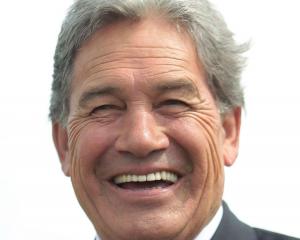But behind the scenes, the New Zealand First leader campaigned in a traditional manner, one often eschewed by party leaders in the modern era. If there was a cup of tea being brewed in provincial New Zealand, Mr Peters was happy to attend - and he reaped the benefits.
While the New Zealand First party is more the Winston First party - and after a relationship that in recent years has been less than rosy - the signs are that National is now prepared to provide some sort of olive branch to Mr Peters.
Prime Minister John Key, knowing Labour and the Greens oppose the Government Communications Security Bureau draft legislation, has invited Mr Peters to a meeting and discussion. Mr Peters, in return, says changes will be needed and his party will need more time to put forward detailed improvements. Parliament got the GCSB law wrong in 2003, according to Mr Peters, and it is essential this time that it is put right.
Politics makes for strange bedfellows. It was not so long ago that Mr Key ruled out ever doing a deal with Mr Peters. But it is important to look at the changing political landscape.
National has consistently avoided doing anything but the clumsiest of deals when it comes to helping a coalition partner into Parliament. Former Epsom MP and Act New Zealand leader Rodney Hide had to practically beg for a ''cup of tea'' with first former National Party leader Don Brash and then Mr Key when he was leader of the Opposition.
Mr Key eventually agreed that National would only seek the list vote in Epsom and Mr Hide was elected. When Mr Hide was later rolled by Dr Brash as Act leader, Act selected former Auckland mayor and National Party member John Banks as its candidate.
Again, it was almost embarrassing to watch Act wait for the anointment of Mr Banks as someone National would support by having its own candidate - Paul Goldsmith - campaign just for the party vote. And who will forget the cup of tea between Messrs Key and Banks when their conversation was recorded and it was alleged Mr Key insulted New Zealand First voters by saying they ''were dying off''?
That phrase must be haunting Mr Key now as he looks at his coalition options in Parliament.
The Maori Party, which provides votes of supply and confidence, is in disarray around whether co-leader Pita Sharples should make way for Te Ururoa Flavell. The departure of Hone Harawira to form the Mana Party already means the Maori Party can only be relied on for three votes in a pinch.
United Future MP Peter Dunne looks assured of retaining his electorate for as long as he wants it, as National continues to stand a list MP against him who is not hugely popular, even in her party. But Mr Dunne is known to shift with the political winds and despite his overwhelming public dislike currently for Labour and the Greens, a cabinet post offering could see him change sides again.
The latest rise in the polls will have given Mr Key and National heart that their popularity may put them in a position to form the next government - if there is a coalition partner.
Forming an alliance with Mr Peters may prove problematic, however. Mr Peters has twice before played the king maker in Parliament. Both episodes ended badly for him and his party. National has always had, until now, people who could talk to Mr Peters - a former National Party MP.
Political friendships, although sometimes stretched, remained strong between Mr Peters and some of his former colleagues. With perhaps two exceptions, there are no National MPs who will have worked with Mr Peters during his time as either a National MP or the New Zealand First leader.
Perhaps that is a positive; certainly working out deals will be best left to others rather than the two party leaders, who show a public dislike for each other. The other certainty is that if Mr Key wants the support of Mr Peters, he must be prepared to play a long game - and to make concessions around policy issues that he may find uncomfortable.



